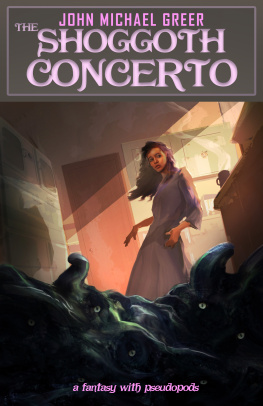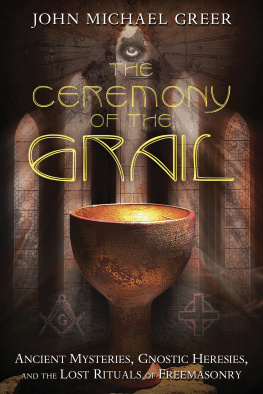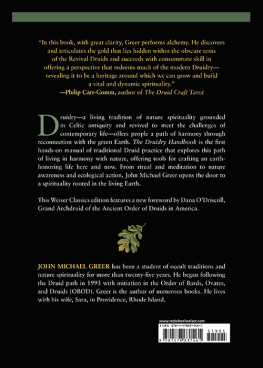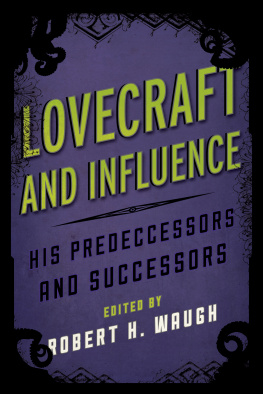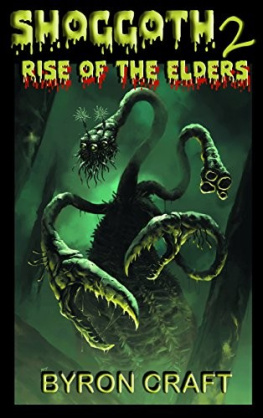CONTENTS
THE SHOGGOTH CONCERTO
a fantasy with pseudopods
by John Michael Greer
ONE
The Songs of Shoggoths
THUNDER ROLLED IN THE night off behind Hobs Hill, rattling the windows of the little apartment. Startled, Brecken Kendall got up from the piano. A glance out the window showed a clear sky spangled with autumn stars, the hill looming up black and hunched close by, and a tiny shape with two red lightsa helicopter, Brecken guessedcircling slowly above it. She shook her head, then saw what might have been a faint flash of light from behind the hill, heard the rumbling sound again a heartbeat later.
Partridgeville weather, she thought. It still doesnt make a bit of sense. She went back to the piano, sat on the bench, forced her attention back to the tricky bit of Telemann she had to have down cold before Wednesday. Mismatched, brightly colored sweats imperfectly hid the gawky angles of her body, clashed with the light brown of her skin; long black hair that never could make up its mind whether it was curly or wavy spilled forward over her face, got pushed back behind her ears with an irritable gesture. As she surveyed the score, her teeth tightened on her lower lip, an old habit. She splayed out her fingers, shook them, and started playing again.
Half a dozen of the notes jarred as she hit them: the old upright piano had already begun its inevitable drift out of tune. Brecken did her best to ignore the sour notes, played the difficult passage over and over again until the mechanical details of playing the piece finally got out of the way and the music started to come through.
Now, once through from the beginning
Thunder rolled again, hard. She gave the nearest window a dismayed look, even though she didnt need to face whatever weather might be on its way, and there was nowhere else she needed to be until her first class in the morning. Something about the sound put a chill down her back, though she couldnt tell what or why.
Youre stressing out over nothing, she told herself. Stop it. She drew in a breath, pushed her hair back behind her ears again, played through the whole piece with as much concentration as she could find. One more roll of thunder sounded, but she made herself keep playing.
By the time shed worked out all the difficult passages, the thunder had stopped. The staccato rhythm of the helicopter sounded loud for a minute or two, faded into silence, and that was that. She glanced up at the tacky plastic clock on the wall in the cramped little kitchenette that filled one corner of her apartment, blinked in surprise at the time: it was almost midnight, much later than shed thought. It was a good thing, she reflected, that she didnt have neighbors to pound on the walls or the ceiling.
Her shoulders complained as she got up from the piano bench. She rolled them forward and back, shook her hands and stretched her fingers until the stiffness went out of them, then went to the futon that filled most of one end of the little apartments ell. A brisk pull on the frame slid it from its daytime state as a sofa to its flat nocturnal shape. Though the thunder had unsettled her, the silence of the night once it was gone seemed oppressive. As she got ready for bed, she could not shake an uneasy sense that something terrible had happened.
SHE WAS UP BEFORE dawn the next day, and put in an hour of flute practice before getting oatmeal going for breakfast and checking for texts and emails on her phone. After the meal she plunged into the days homework, trying to get far enough ahead that she didnt have to feel guilty about doing something else that evening.
In the pale light of morning, the apartment looked like exactly what it was, a detached garage that somebody retrofitted to cash in on the market for student housing when Partridgeville State University began to ride the postwar boom. The floor sagged visibly in the middle where a trench left open to allow car repairs from underneath had been bridged over with plywood and third-rate lumber. Cheap wallboard painted off-white defined the walls and ceiling, and old stained linoleum covered the bathroom and kitchenette floors, replaced elsewhere by a carpet that had been burnt orange a long time ago and now just looked burnt: that was as far as the interior decorators art had gotten with it. The apartment had only three virtues: the rent, which was low; the neighborhood, which was green, quiet, and far enough from campus to keep visitors scarce and the party crowd at a good distance; and the lack of anyone living on the other side of its walls, floor, and ceiling, which meant that a music student could practice at all hours without having to compete for the always overbooked practice rooms on campus.
From outside the apartment still looked like a garage, complete with a rollup door facing the alley, though that had been nailed shut for decades. Garbage cans and recycle bins lined one wall: one of each for Brecken, for Mrs. Dalzell the landlady, and for the two tenants on the upper floor of her house. Normally the cans stood in a row like so many tin soldiers, but at quarter to ten, when Brecken finally put on street clothes, loaded her tote bag, and left for her first class, all the garbage cans had been knocked over. Mrs. Dalzell was bustling around with rubber dish gloves on her hands, picking up refuse from the neatly mown grass. An odd acrid odor, like nothing Brecken recognized, hung around that end of the yard.
Oh, good morning, Brecken, Mrs. Dalzell said. Hair dyed boot-polish black was her one concession to vanity, contending with baggy jeans, a shapeless green sweatshirt, and a wrinkled face the color of underdone toast. Did you hear anything out here in the small hours? Something got into the garbage cans. I hope we dont have to deal with those raccoons again.
Brecken got halfway through saying that she hadnt heard raccoons before Mrs. Dalzell said, Oh, and you got a package slip from the postman yesterday. She handed it to Brecken, who gave it a casual glance and then a second, appalled look. The postal clerk had written the senders zip code on the pink form, and it was Uncle Jim and Aunt Marys in Harrisonville. A package from Aunt Mary any time from July through the runup to Christmas meant
Brecken tried to shove the idea out of her mind. Before she could manage the feat, Mrs. Dalzell started talking again, this time about an article on the Partridgeville Gazette about sewer rates, and it took deft maneuvering for Brecken to leave for her classes. She ducked through the narrow gap between Mrs. Dalzells house and the house next to it. That put her on Danforth Street, which ran down the long slope from the foot of Hobs Hill to the university campus.
As she shouldered her tote bag and started walking, she could see Partridgeville spread out before her in the morning. To the south, Mulligan Wood stretched from Hobs Hill to the distant pine barrens, Belknap Creek flowed green and silent through the oldest part of town to Partridge Bay, and on the creeks far side the low uneven mass of Angell Hill rose up, with the First Baptist Church white and gleaming at its crest. To the north, a long arm of Hobs Hill covered with pines swept around to the sea, shutting out the view toward Mount Pleasant. Straight ahead, due east along Danforth Street, neatly squared blocks of postwar housing gave way to strip malls and apartment buildings, then to the stark concrete buildings of the university, and finally to the old downtown; beyond that, Partridge Bay met the Atlantic in a narrow gap between rocky breakwaters, and the Mulligan Point lighthouse thrust up toward a gray sky. An ordinary American college town, with an ordinary university that happened to have a better than average music program: that was what Breckens high school counselor had called it, and if there was more to it than that, Breckens time there hadnt brought her within sight of it.

